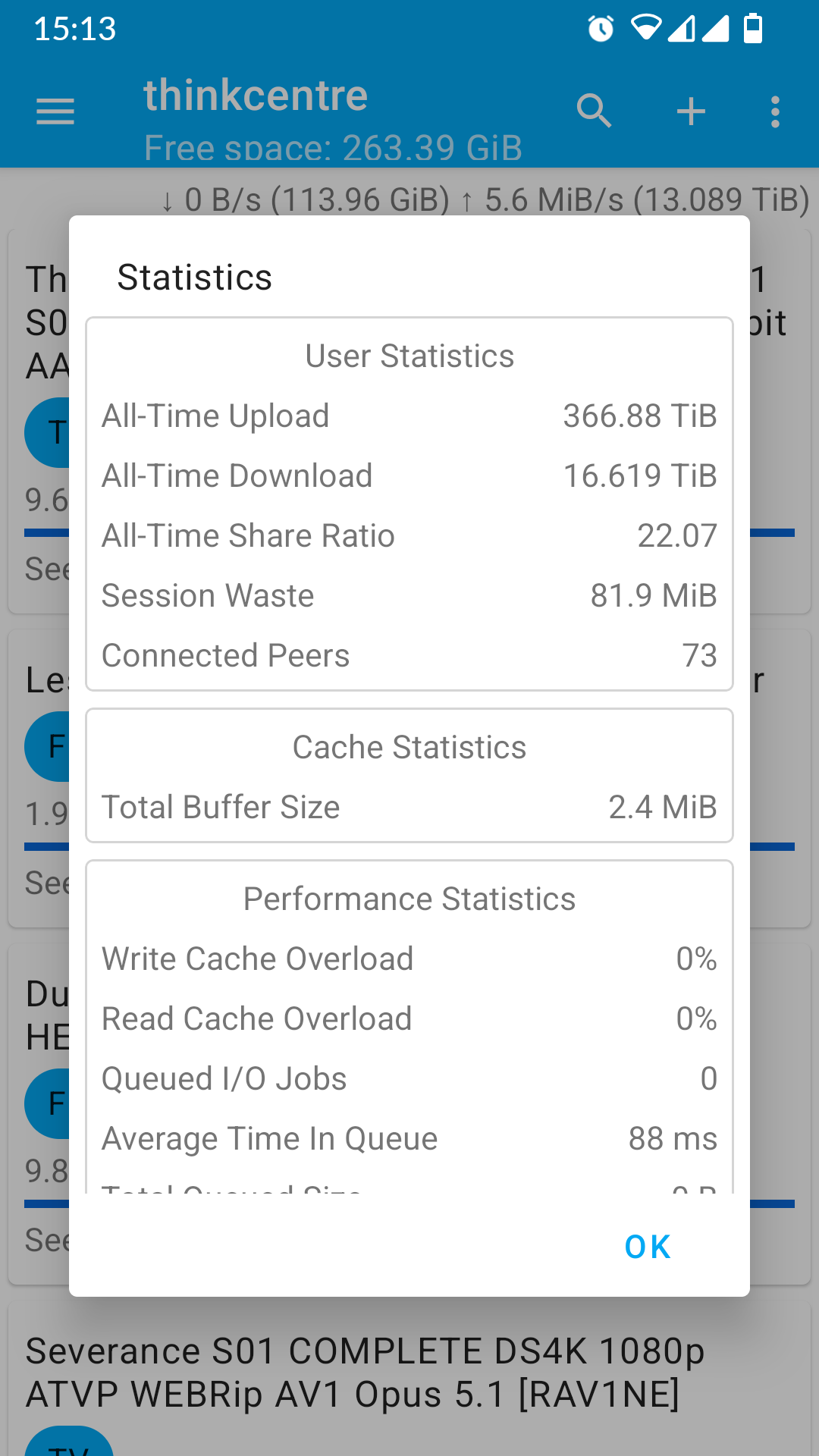

1337x is my favorite. Look for efficient encodes like HEVC or AV1 for a better quality/size ratio (and ideally AAC or opus for audio). It’s usually in the torrent name as well as the resolution, source, etc.
celles-ci sont pipes.sh


1337x is my favorite. Look for efficient encodes like HEVC or AV1 for a better quality/size ratio (and ideally AAC or opus for audio). It’s usually in the torrent name as well as the resolution, source, etc.




I don’t use a VPN but still had to assign a port interval or something to Soulseek from the router; other software maybe picks a more sensible (lower) port number?


Oh another tip, I have set it to always create subdirectories even if it’s single files in the torrent. Makes it easier to browse the main folder alphabetically later!


Other than linking in the filesystem as Grippler said (took me a while to understand soft and hard links on linux but they’re soo useful); you can create categories with a default location (e.g. /qbt/-TV, /qbt/-Films), so you only need to pick a category when adding a torrent, and “Automatic Management mode” should save it to the right folder automagically. Also if you don’t like the names you can rename both items in the torrent list and/or their corresponding foldernames and filenames, I do all this from qbittorrent (probably doable with other software as well).


You gotta pump those numbers up 🤓 holy sheet 16TiB is actually more dl than I remembered…this is from a 2TB ssd :) in a couple of years



Yep. Loads of unorganized (and some organized) files uploaded over decades via FTP 😅 a mess full of gems


Apparently the issues are mostly with the outgoing download links from libgen.rs and .st (passing through libgen.lol), including the IPFS links which were being problematic in the past few months already.
Instead I just tried something from libgen.gs which is the one for comicbooks, and it’s downloading fine from the direct link.
Thankfully most if not all content should be backed up on Annas-archive!
Btw Plasma 6 is glorious. First time Wayland “just works” without me noticing too.
Recently wanted to try KDE 6 on my second laptop and after being pissed off at the lack of encryption with Void installer (gotta do it manually, have done it in the past but I’m lazy), another fail with NixOs (known bug with encryption in the latest stable installer) the easiest way was installing Arch lol.
I used archinstall as suggested, just answer questions, no manual voodoo incantation required. You can do it.


Oh sorry, can’t think of an easy solution then. I’ve seen that audiobookshelf can find metadata for you, that could be doable. They also support ebooks but if I understood correctly from their docs they don’t get synced to the audio position, just to themselves.
A promising but still in beta software is Storyteller, under very active development here. It works by creating a ‘rich’ epub that contains the audio synced line by line, which you can then read/listen to with just one app.
There’s also older software with a similar approach like syncabook but at a glance it seems less usable than Storyteller.


HDD usually don’t have a limited number of writes like SSD do, if they are robust, maybe enterprise units, they can last a long time.
In a home environment some prefer using slower (5400 vs 7200), non-enterprise hard drives, maybe fewer drives with higher capacity, to reduce noise, power consumption and improve cooling (in enterprise settings this stuff is standardized and they don’t care about noise, in my custom pc I might have forgotten to use the vibration dampeners or I mounted the disks vertically…every white box is different).
Also there are big differences between different models and makers. If they’re cheap enough those helium filled enterprise drives can be one of the best options!


Those big files like .m4b (b stands for book) should have chapters within it, if you open them with mpv on your pc you should be able to see them on the time bar. On Android I’ve been using Voice, it’s really well polished and shows a big chapter name so I usually remember where I was if I switch devices, even if not to the exact minute.
I figured out how to encode to a single m4b in fre:ac so I only use Voice now (or my ipod, which was the reason why I learned how to use fre:ac).
I know you asked for syncing (one day I’ll try adding the audiobook plugin to my jellyfin), but this works for me.
If you prefer a folder of files, you can use fre:ac or many other encoders/tools to split them up.


croc is great, works even when devices cant find each other on the network, or with gigantic folders (I use it between computers).
Or Simplex chat, I dont use it to chat but only to quickly share between phone and laptop :)
Thanks I just tried PassAndroid, pretty slick! I was using KDE Itinerary (way more features and always improving, but not too polished yet) to manage tickets before, now I have an alternative.
Regarding wireguard I always used WG Tunnel from f-droid, I’m looking at the official Wireguard app screenshots and it seems to have the same functionality (easy config import via QR scan, notification shade button), maybe it looks prettier. Not on f-droid, that’s why I didn’t come across it before.


Hi there, it looks like Journeys is considered the 23rd season of Pokemon (wikipedia says so too), I found it on TMDB: https://www.themoviedb.org/tv/60572/season/23
A lazy option to set up a player (what I do a t least), is installing via flatpak Jellyfin Media Player. For android, installing from F-droid.
Awesome! I love this app for its widget, it’s very quick to jot down some notes during the day, and you can scroll the note contents from the homescreen.
Together with the Gallery they were my must-haves from Simplemobiletools, now from Fossify
This is a good approach. I would not even use Izzy’s repo shown by OP (at least not on a daily driver device - great for testing newer apps I’m sure) because I don’t see it as advantageous to get updates so quickly or access to apps that are not yet (or will never be) fully open source.
Basically I see most of the value of F-Droid in their build server and official repo. So I only add repos with a very short list of apps, like microg and KDE.
I can always install the odd apk manually, or use Aurora store (preferably in the work profile)
I noticed recently that Gramophone has a Dates tab, a list of years in increasing order that groups Songs together. So not albums exactly, but pretty cool nonetheless, it grabs a random cover for each year.